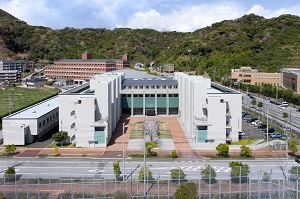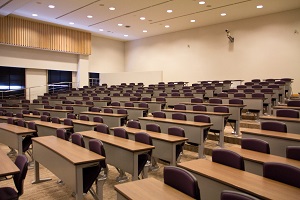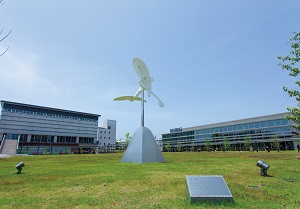本文
Graduate School of Human Life Sciences Each area
Graduate School of Human Life Sciences
Each area of Human Life Studies (Master’s Program)
The Human Life Studies Department is divided into three areas: Nutrition/Life Sciences, Social Welfare, and Culture. As a rule, graduate students will focus on one area, while choosing a topic of research that connects to one or both of the other areas.
For example:
"Living environment of elderly people" → Focus on "Life Sciences,” linked to Social Welfare
"Culture and Normalization" → Focus on “Culture,” linked to Social Welfare
"Cultural Environment and Welfare" → Focus on “Life Sciences,” linked to Social Welfare and Culture
It is also possible to set research themes for one specific domain.
Nutrition/Human Life Sciences
Students learn about food science, human nutrition, and life sciences, and nurture the ability to comprehensively grasp various problems relating to food and come up with theoretically founded solutions.
As area subjects, the following courses are taught to enable students to learn about the scientific aspects of food, the physiology of nutrition, dietary science, the environment surrounding food, as well as epidemiology and statistics, which are crucial progress in these areas. Taken together, these courses allow students to cultivate their ability to approach and solve problems related to food in a theoretically sound and scientific way.
As area subjects, the following courses are offered.
Food Science (Scientific Theory of Food Products/Scientific Theory of Food/Food Science Practicum/Environmental Ecology)
Human Nutrition (Theory of Human Nutrition/Theory of Health Dynamics/Statistical Theory of Nutrition and Life/Nutritional Epidemiology)
Life Studies (Special Theory of Nutrition and Life Special)
Nutritional Education Program
Based on existing research, we train experts who familiarize themselves with scientific perspectives and theories, and are able to coordinate food education.
The Nutrition Education Course offers the following courses, in which we foster the students’ ability to select information based on scientific evidence, and based on these, to tackle various issues regarding dietary habits and to bring about effective changes toward a healthier and more varied diet. In addition, we cultivate the ability to scientifically analyze and show the effects obtained.
The following courses are offered in the Nutrition Education Course.
Food Science (Scientific Theory of Food Products/Scientific Theory of Food/Food Science Practicum/Environmental Ecology),
Human Nutrition (Theory of Human Nutrition/Theory of Diet/Dietary Habits Practicum/Theory of Health Dynamics/Statistical Theory of Nutrition and Life)
Life Studies (Special Theory of Nutrition and Life)
Social Welfare
We aim to construct support methods, systems, policies, and welfare assistance systems that are the supporting elements of a fulfilling human life.
As area subjects, we provide the following courses, through which we explain how to support the development of social welfare set-ups from the micro to the macro scale, and in which we strive to get a good grasp of changes at the level of institutions, policies, and social welfare systems, and gain insight into good methods of analysis and concrete research subjects.
As area subjects, the following courses are taught.
Principles of Social Welfare/Theory of Social Work/Theory of Social Security/Theory of Administrative and Fiscal Policy Regarding Welfare/Theory of Community Welfare/Theory of International Welfare/Theory of Nursing Care Welfare/Theory of Geriatric Welfare/Theory of Welfare for the Physically Challenged/Theory of Welfare for the Mentally Challenged/Theory of Psychiatric Social Work/Theory of Child Welfare
Cultural Studies
We aim to grasp the various forms of culture that are the product of the diverse ways in which human beings lead their lives, and to contribute to the creation of expressions of cultural richness.
Area subjects are taught by full-time faculty specializing in English studies, English literature, English literature, Japanese literature, Japanese language, Chinese literature, International Japanese Studies etc.
We are making continued effort to consider various issues relating to specific regions or cultural life in general, from diverse angles, and in order to do so we conduct analyses from a humanities as well as a social sciences perspective.
In the field of Cultural Studies, we offer the following subjects.
Regional Culture/Japanese Culture/Chinese Culture/English Language and Culture/International Japanese Studies
English Language Education Program
The English Education Course is composed of the following subjects: English learning to explore the structural features of English; English pedagogy from an applied linguistic approach to acquisition and guidance of English; English literature and American literature exploring English/American culture through reading comprehension of literary texts; International Japanese Studies, striving to reconsider Japanese history and culture from a foreign perspective.
In all these subjects, the goal is to extend the insight and mastery of English itself, and to raise the teaching ability of English teachers. To that end, we consider from various angles the structure and function of English, the cultural phenomena surrounding English, and the process of learning English as a second language.
In the English-language education course, the following courses are offered.
Advanced English Linguistics/Advanced English Language Education/Advanced British Literature/Advanced American Literature/Advanced International Japan Studies/Seminar on English Language and Culture









